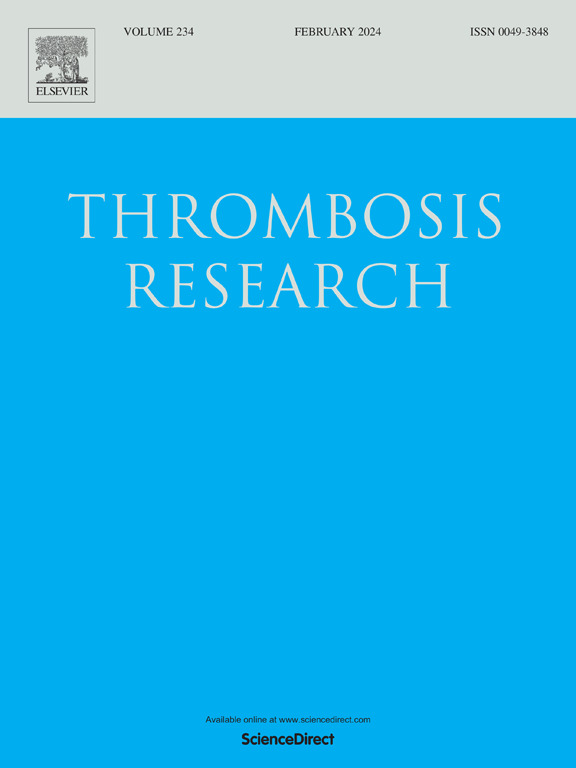“Who am I to say that I'm not going to take it”: patient perspectives on decisions about antithrombotic therapy in the context of advanced cancer
IF 3.4
3区 医学
Q1 HEMATOLOGY
引用次数: 0
Abstract
Introduction
The decision to reconsider antithrombotic therapy (ATT) in cancer patients nearing the end of life is complex given the increasing risk of haemorrhage and thrombosis. A decision support tool (DST) is being developed to facilitate this process. Understanding patients' experiences, values, and perspectives are an essential component, yet remain largely unexplored.
Aim
To explore these patients' experiences, values and perspectives regarding ATT use.
Methods
Qualitative study using semi-structured interviews with patients with advanced cancer receiving ATT, across Denmark, France, Spain, and the United Kingdom. Data were analysed using Framework Analysis.
Results
Sixty patients and 13 relatives participated. Three major themes were generated:
- 1.ATT is important and lifelong: Deprescription was perceived as counterintuitive; continuation was preferred, providing a sense of security.
- 2.Varying perspectives regarding roles and responsibilities in ATT decision-making: Patients' views regarding their role varied. When a good relationship existed with their clinician, patients trusted them to lead on the decision. Relatives played a key supportive role.
- 3.Challenges in navigating ATT management in the context of advanced cancer and multiple comorbidities: Decisions relating to ATT were rarely made in isolation. Patients prioritised cancer management and described difficulties navigating multiple health concerns.
Conclusion
Patients found decision-making around ATT near the end of life multifaceted, occurring amid a myriad of competing priorities. While patients reported a reticence to discontinuing, ultimately many deferred such decisions to a clinician, whose role was highly valued. These findings support a need for a DST, to support informed and shared choices in ATT decisions.
“我凭什么说我不会接受它”:晚期癌症患者对抗血栓治疗决策的看法
考虑到出血和血栓形成风险的增加,在接近生命终点的癌症患者中重新考虑抗血栓治疗(ATT)的决定是复杂的。目前正在开发一种决策支持工具,以促进这一进程。了解患者的经历、价值观和观点是必不可少的组成部分,但在很大程度上仍未得到探索。目的探讨这些患者使用ATT的经验、价值观和观点。方法采用半结构化访谈对丹麦、法国、西班牙和英国接受ATT治疗的晚期癌症患者进行定性研究。采用框架分析法对数据进行分析。结果患者60例,亲属13例。产生了三个主要主题:1。ATT很重要,而且是终身的:去处方被认为是违反直觉的;继续是最好的,提供一种安全感。关于ATT决策中的角色和责任的不同观点:患者对其角色的看法各不相同。当病人和他们的临床医生关系良好时,病人就会信任他们来做决定。亲属起到了关键的支持作用。在晚期癌症和多种合并症的背景下指导ATT管理的挑战:与ATT有关的决定很少单独做出。患者优先考虑癌症管理,并描述了应对多种健康问题的困难。结论:患者发现在生命末期围绕ATT的决策是多方面的,发生在无数相互竞争的优先事项中。虽然患者报告说他们不愿停止治疗,但最终许多人将这种决定推迟给临床医生,因为他们的作用受到高度重视。这些发现支持需要DST,以支持在ATT决策中作出知情和共同的选择。
本文章由计算机程序翻译,如有差异,请以英文原文为准。
求助全文
约1分钟内获得全文
求助全文
来源期刊

Thrombosis research
医学-外周血管病
CiteScore
14.60
自引率
4.00%
发文量
364
审稿时长
31 days
期刊介绍:
Thrombosis Research is an international journal dedicated to the swift dissemination of new information on thrombosis, hemostasis, and vascular biology, aimed at advancing both science and clinical care. The journal publishes peer-reviewed original research, reviews, editorials, opinions, and critiques, covering both basic and clinical studies. Priority is given to research that promises novel approaches in the diagnosis, therapy, prognosis, and prevention of thrombotic and hemorrhagic diseases.
 求助内容:
求助内容: 应助结果提醒方式:
应助结果提醒方式:


